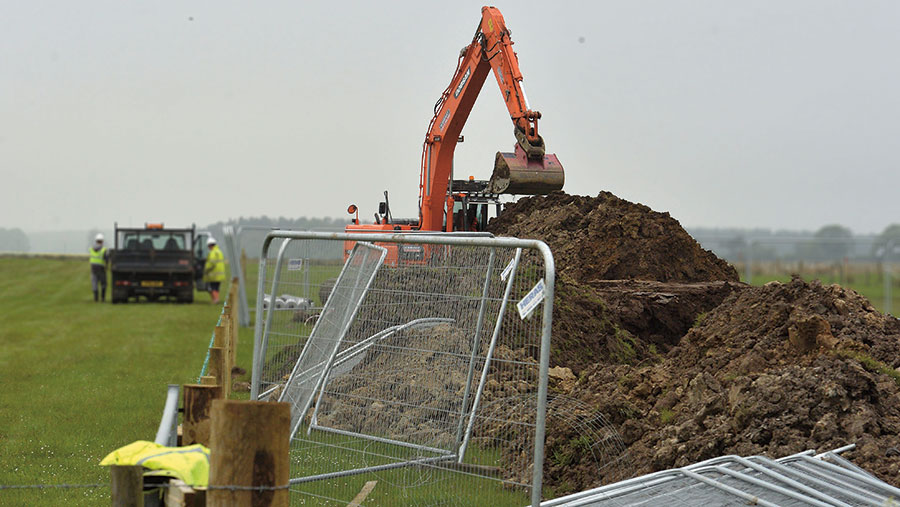Compulsory purchase – what are my rights as a farm tenant?
 © Simon Turner/Alamy Stock Photo
© Simon Turner/Alamy Stock Photo As well as freehold property, compulsory purchase orders (CPOs) allow an authorised body to acquire agricultural tenancies.
Knowing what you, as a tenant, are entitled to as well as your obligations, is essential for making sure your livelihood is protected as much as possible.
The impact of a CPO on owner occupiers of farms and estates, are generally well known.
However, it is very often the case that tenants are most adversely affected, with their business bearing the biggest burden, particularly during construction.
See also: Compulsory purchase – understanding who can enter your land
 Edward Briggs
Edward BriggsRural managing partner, Bidwells
As well as freehold property, CPOs allow an authorised body to acquire agricultural tenancies and residential or commercial leases, plus other rights, such as wayleaves and easements.
The impact of a CPO on owner-occupiers of farms and estates, are generally well known.
However, it is very often the case that tenants are most adversely affected, with their business bearing the biggest burden, particularly during construction.
Knowing what you are entitled to as well as your obligations, is essential for making sure your livelihood is protected as much as possible.
Access on tenanted land
As with any proposed scheme, inevitably an acquirer will seek to take entry for investigatory surveys prior to a scheme commencing.
Before this happens, it is vital to identify the powers that are being relied on and the rights that are contained in such powers.
There is a clear distinction between agreeing access via negotiation and where powers of entry are used.
With the latter, compensation is usually limited to crop losses and cost of reinstatement of the damaged area, whereas a negotiated entry will often generate higher payments.
In the case of a let holding, it is the tenant who will deal with such access arrangements and who will suffer the burden of the damage caused.
Thus it is essential that the tenant (or their appointed agent) takes the lead in such negotiations.
That said, in such circumstances it is also advisable tenants liaise with their landlords before agreeing access or any compensation offers.
What can you claim for?
For schemes that involve the permanent acquisition of land, the heads of claim for a tenant are generally the same to those for the owner-occupier, with the exception that there is, of course, no claim for the value of land taken.
This is replaced by a claim for the value of the unexpired term of the tenancy over the affected area, where land is acquired.
Additional compensation headings include severance (where a tenanted holding is divided by a scheme) and injurious affection (the permanent impact on the value of the remainder of the tenancy interest), disturbance (temporary losses), professional fees and a contribution to the value of the claimant’s time and expenses where a loss can be proven.
See also: Compulsory purchase of farmland: Claim what you are owed
Disturbance can cover a broad spectrum of issues that may be particular to a farm, for example this can range from crop loss and Basic Payment Scheme monies foregone, to rehousing livestock or DIY liveries offsite during the works, and paying for the cost of feed and labour for such animals during that period.
This can also cover the temporary relocation of subtenants where converted farm buildings are sublet and these business cannot operate during the scheme.
It will also cover relatively simple issues such as paying for the cost of new farm plan or sorting out a stewardship scheme, if the qualifying points needed have been compromised.
In addition, to reflect that the interest is acquired compulsorily, occupiers of farmland are entitled to claim an occupier’s payment of up to £25,000 or 2.5% of the entire compensation payable. This compares with the basic loss payment (paid to land owners) which is 7.5% (up to £75,000).
However, under the proposed government review of the compulsory purchase system it has been suggested this be reversed, because it is considered that the main burden of any scheme is borne by the occupier.
See also: How to restore your land after compulsory purchase works
When a utility company wishes to acquire a right only, rather than permanent land take, for example an easement over land to lay a pipe or cable, and relies on compulsory powers, the tenant’s claim is usually limited to disturbance compensation only, such as crop losses, reinstatement and other similar matters.

© Bruce Adams/Rex/Shutterstock
The easement payment reflecting the permanent diminution in the value of the land generally goes to the landowner.
Notwithstanding this, utilities often offer additional payments to owners and occupiers to incentivise an early agreement consenting to a particular project.
It is not uncommon to split these payments on a 75:25 basis between landlord and tenant.
However, some tenancies, particularly farm business tenancies (FBTs), reserve the right for the landlord to grant such rights and to receive all of the incentive payments.
Such reservations need to be considered in the context of any negotiations.
Accommodation works
Accommodation works can be an essential part of a tenant’s compensation strategy.
Tenants, just like landowners, are also entitled to ask the acquirer to carry out accommodation works to mitigate the impact on the farm and if this lowers the overall compensation claim.
Examples include new access roads to a field severed from other parts of the holding, new water/power supplies, fencing and gates, and where buildings have been affected, replacement facilities such as new farm buildings, yards and livestock-handling systems.
The need for such mitigation works are an essential part of the early discussions that affected parties should have with an acquirer.
A common scenario is where land is served form the main part of the holding by a road or railway and an accommodation bridge could connect the severed parts.
However, the bridge could cost, say, £500,000 and the severed land could be worth, say, £300,000.
In such circumstances the acquirer would be better off acquiring the severed land at market value, rather than build the bridge.
This cost/value scenario is even more acute when assessing a tenanted interest, particularly if a landlord is not interested in negotiating such works.
How do you compensate a tenancy?
In most cases, the largest part of an occupier’s claim is likely to be for the assessment undertaken to value the unexpired term of tenancy.
Under the Agricultural Holdings Act 1986, the tenant affected has a limited choice.
The tenancy can be terminated by the acquirer stepping into the landlord’s shoes and then serving a notice to quit.
The tenants is then entitled to compensation of five or six times the value of the rent already paid, together with compensation for tenant’s right and improvement claims.
The rental calculation is offset by a deduction of four times the value of the annual rent, which is a tax-free payment.
This is not usually an attractive option for a tenant.
The alternative is for the tenant to be compensated directly through the compensation code, which covers the value of the unexpired term of the tenancy, along with tenant right, disturbance and a “re-organisation payment” of a multiplier of four times the annual rent.
When assessing the value of the unexpired term of any tenancy, a valuer has regard to the terms of the tenancy, particularly its length, which is particularly relevant to shorter-term FBTs and business leases.
Issues such as break clauses and user restrictions are important factors.
In the case of a secure 1986 Act letting, the age of the tenant and possible opportunities for succession, are essential parts of the formula.
Armed with this information, the value of the unexpired term can then be calculated in a number of ways depending on circumstances and there is no fixed method of approaching this.
One approach is to look at the profitability of the holding as if the infrastructure scheme had not been proposed and comparing this to the impact suffered as a result of the proposals.
This differential can be capitalised to reflect the anticipated lifetime of the tenants and any successor, or the remaining term of the lease.
See also: Compulsory purchase – how to minimise impact on your farm
This has regard to the tenant’s investment in the holding, the likely rent payable and will reflect what a hypothetical party would pay to receive that income stream during the anticipated period, reflecting all of the associated trading risks.
There is an alternative approach, which is particularly relevant when a tenanted farm is completely acquired, either as a result of the scheme or the tenant serving a blight notice because the scheme would make it impossible to farm anymore.
This involves looking at the cost of putting the tenant back in the position they were in before and reflects any scarcity in the market of finding a new letting on similar terms.
It could allow for the cost of buying an alternative farm of an equivalent size, granting the tenant a new tenancy on equivalent terms on a sale-and-lease-back arrangement, and the selling the freehold subject to that new lease.
Typical items of compensation might include the value of the business’s goodwill, loss on full or part sale of stock, vehicles and plant machinery, redundancy costs and the administrative costs of winding up the business.
The value of the unexpired term is then assessed by looking at the difference in the cost of buying the farm and thus sale price subject to the new lease.
There are many variables to these approaches and the scope for debate is wide.
Minimising the impact of a scheme
As with all compensation schemes the claimant, whether landowner or tenant, is obligated to mitigate their loss to their best ability so that compensation is minimised.
In respect of relocation, tenants will be expected to try and relocate their business if possible.
However, with sensible dialogue with the acquirer, it may be possible for them to assist in the relocation search.
In such circumstances relocation costs will be a relevant part of the claim.
Good advice and communication are key
The need to liaise as early as possible with the acquirer is essential.
A good line of dialogue should be established early on – agreement on accommodation works, alternative temporary arrangements during construction and initial compensation discussion are vital.
Often this should be best undertaken by a specialist surveyor or valuer, who is well used to dealing with such matters.
Specialist advice is key.
Without such advice there is a risk that the claimant will not be properly compensated.
The acquirer will not be the claimant’s friend and inevitably will be looking to implement the scheme for the least possible cost. You must always be mindful of this.
